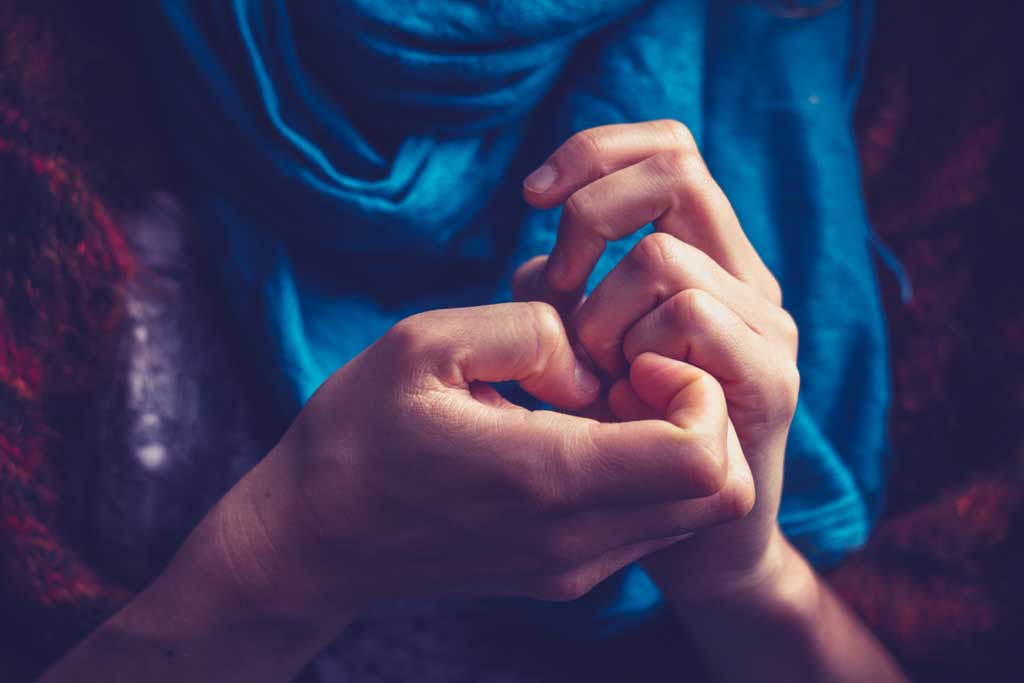Anxiety symptoms can be overwhelming and all-consuming. But, you do not have to suffer in silence. Knowing the symptoms of anxiety is the first step to taking effective action.
Living with anxiety can be exhausting. Existing in a constant state of ‘fight or flight’, (your body’s natural stress response), you might feel an overwhelming sense of nervousness, stress, panic, or even anger in the most common everyday situations.
You are not alone. Nearly 40 million Americans currently live with anxiety.
Like many mental conditions, the experience of anxiety is highly subjective. No two people experience identical symptoms, meaning it can sometimes be hard to pinpoint. Unlike certain physical conditions with a clear set of symptoms and tests, anxiety can have ambiguous, interconnecting physical and psychological symptoms, from panic attacks to irritable bowel syndrome (IBS). Furthermore, anxiety can be hard for others around you to understand and respond to. In fact, research shows that only 25% of people with a mental health disorder feel like others are understanding their experience.
Some of the most common symptoms experienced by sufferers include…
- A sense of doom, dread, or fear about the present or future
- Avoiding behaviors to get out of social situations
- A rapid heartbeat or heart palpitations
- Sweaty palms or excess body sweating
- Shortness of breath or difficulty controlling breathing
- A preoccupation with what others are thinking about you
- Fear of being judged
- Agitation or anger
- Nausea and/or IBS
- Difficulty sleeping
- Difficulty eating or eating excessively
- Self-medicating to reduce stress levels (e.g. drinking alcohol)
These symptoms can come and go or might feel like a permanent fixture in your life. Some symptoms may present themselves mildly, others severely.
But anxiety does not have to rule you. There are ways to manage anxiety and drastically improve the quality of your life.
Create a sense of calm
Many of the physical and psychological symptoms of anxiety can be managed with basic relaxation techniques. Most of these techniques can be practiced anywhere, whether you are on a bus, at a party, or in your bed trying to fall asleep. Meditation, yoga, mindful thinking, deep breathing, and positive affirmations are all methods you can try. If you have access to the internet via your phone, you can find apps and videos that help you enter this state of relaxation no matter where you are. Or, you can join a meditation or yoga group near you. Once you discover a successful method, practice it whenever you feel a surge of anxiety.
Set small goals
Anxiety can make it challenging to reach a goal because the goal itself feels overwhelming. This is why people with anxiety tend to procrastinate in the workplace because their tasks feel too daunting to achieve. For this reason, it is a great idea to break these activities down into smaller goals. Reaching one ‘mini goal’ can feel encouraging, motivating you to reach the second goal. You can do this using a notepad and pen. Simply write down your overall goal, then three or four smaller goals you should reach to complete the overall task. Focus on one small task at a time and you will soon find yourself becoming more productive at work and home.
Practice good self-care
Sometimes, anxiety can stop you in your tracks and prevent you from taking care of yourself. You might skip meals, miss social events, stay up late worrying, or isolate for days or weeks at a time. For this reason, if you suffer from anxiety you must become mindful about self-care. Make a conscious effort to look after your body and mind, especially when anxiety is peaking. You might enjoy taking a long bath, cooking nutritious food, or simply inviting a friend over for coffee. Remember that poor self-care can worsen the symptoms of anxiety, so you mustn’t ignore your needs.
Minimize anxiety-inducing behaviors
While having anxiety is not your fault, some behaviors can worsen the symptoms. Understanding these behaviors is the first step to reducing the severity of the symptoms. Alcohol consumption, for example, can heighten the symptoms of anxiety. Interestingly, many anxiety sufferers self-medicate with alcohol because it temporarily calms the body. However, these effects are short-term. The overall result from excessive drinking is increased anxiety and reliance on further self-medication to rectify the problem. Similarly, too much caffeine can increase anxiety levels, as can high sugar intake.
Exercise is a fantastic way of reducing anxiety levels and balancing your mood. While you may not feel like pulling on your running shoes at the height of an anxious episode, this is one of the best ways to minimize the negative feelings and achieve a healthier outlook for the rest of the day.
Know that anxiety is treatable
You do not have to live with anxiety forever. It is not an innate part of your personality. Often anxiety is a learned response. Sometimes it occurs after a difficult life event, or as a secondary condition to physical disease or disability. For example, some people recovering from a serious illness can develop debilitating anxiety about the illness returning. Attending a behavioral health clinic can be the first step to reducing the symptoms of anxiety.
A behavioral health clinic will give you the tools and resources to understand where your anxiety originates from, how it is impacting your life, and ways you can reduce the symptoms and enjoy a happier, healthier existence. You do not need to rely on medications to remove the symptoms of anxiety. Simply talking about the problem and discovering strategies that work for you is enough to make a real difference.
If you or someone you know is suffering from anxiety symptoms, the behavioral health specialists at ARcare are here to help. Get in touch with us today to discuss how our behavioral health service can work with you to alleviate anxiety symptoms and get back to enjoying your life.
